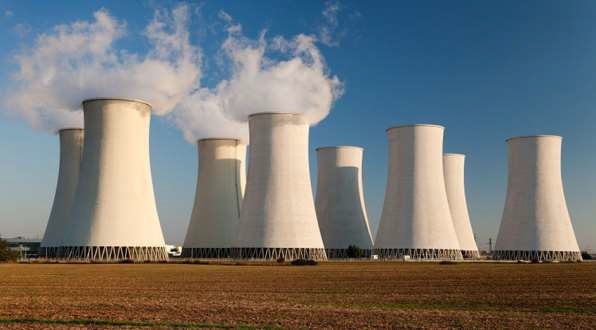The energy released by the change in the nucleus of atoms is known as nuclear energy. The changes in the nucleus of atoms is normally caused by either nuclear fusion or nuclear fission. The technology that manipulates such changes in nucleus (nuclear reaction) of some specific elements and transform into energy is known as nuclear technology.

The energy released through the nuclear reaction is very high. For example, the fission of 1 kg of uranium-235 releases about 18.5 million kilowatt-hours heat.
Nuclear reactions naturally occur in chain reactions and hence keep releasing energy in continuity. In 1942, the Italian physicist Enrico Fermi first successfully produced the nuclear chain reaction.
What is Nuclear Fuel?
Nuclear fuel is the element that is used in nuclear power plants to produce heat to power the turbines.
Following are the major fuel elements −
- Uranium dioxide
- Plutonium
- Uranium nitride
- Uranium carbide
- Pressurized water reactor
- Boiling water reactors, etc.
Application of Nuclear Technology
Following are the areas where Nuclear Technology is applied −
-
Production of electric energy.
-
Nuclear technology is also used in different industries. For example, manufacturing of plastics and in the sterilization of disposable products.
-
Manufacturing of nuclear weapons for the defense forces of the country.
-
Medicinal use. For example, radiotherapy for the treatment of malignant tumors.
-
Frequently used in agricultural field to control pests, maximizing water resources, etc.
-
Used to reduce the environmental and health consequences of large-scale use of fossil fuels.
Advantages of Nuclear Energy Production
Following are the Advantages of Nuclear Energy Production −
-
Nuclear energy has the least impact on the environment, as it does not pollute air.
-
Nuclear plant does not require a very large area for setup.
-
Nuclear energy plant does not release greenhouse gases.
-
Once constructed and made it operative, its maintenance cost is much cheaper
Disadvantages of Nuclear Energy Production
Following are the Disadvantages of Nuclear Energy Production −
-
It is very expensive to set up a nuclear plant.
-
Different types of approvals are required including government’s approval.
-
Nuclear waste is very hazardous, as it remains radioactive for thousands of years.
-
Though it is rare, but nuclear accident is highly fatal. For example, the Chernobyl disaster (about 30 thousand people died).
Nuclear Power Around the World
Consider the following points to understand the position of Nuclear Energy around the world −
-
Nuclear energy is going to be the next super energy of the world because of its efficiency.
-
At present, not many, but about 31 countries are involved in developing nuclear energy.
-
There are about 440 nuclear reactors, which are producing energy for commercial purposes.
-
Nuclear energy provides about 14 percent of the world’s total electricity requirements.
-
The United States of America is the largest producer of nuclear energy, as it generates about one-third of world’s total and France is the second largest producer
-
In terms of percentage of share in total domestic electricity generation, France is the largest generator of nuclear energy.
-
In France, nuclear energy shares about 72 percent of the total domestic energy production.
Learning working make money